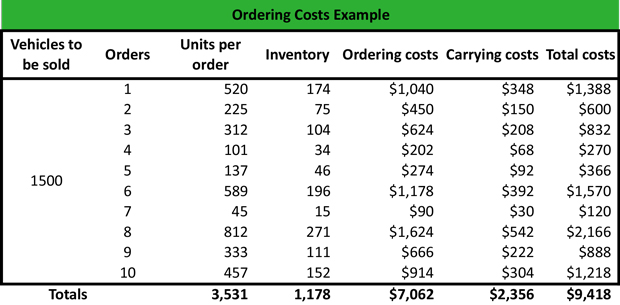Definition: Ordering costs are the costs related to the preparation of a supplier’s order, including the cost of placing an order, inspection costs, documentation costs, and others.
What Does Ordering Costs Mean?
What is the definition of ordering costs? Typically, ordering costs include expenses for a purchase order, labor costs for the inspection of goods received, labor costs for placing the goods received in stock, labor costs for issuing a supplier’s invoice and labor costs for issuing a supplier payment. These costs are irrelevant from the size of the order and are incurred every time a firm places an order.
Furthermore, the ordering costs are inversely related to the inventory carrying costs, i.e. the lower the carrying costs, the higher the ordering costs. Firms monitor their inventory carrying costs to leverage their orders and minimize the ordering costs.
Let’s look at an example.
Example
Company ABC is a car manufacturer. The company manufactures and sells luxury vehicles to retail and institutional customers and has several suppliers who produce the parts required to assemble a vehicle. The company’s accountant wants to calculate the ordering and carrying costs for the next fiscal year based on the number of vehicles that the company is expected to sell.

The company expects to sell 1,500 vehicles in the coming year. The accountant estimates that it would need 10 orders of different supply parts, which will cost $7,062 in total. These ordering costs are expected to cover for the low inventory of 1,178 items that the company has in stock.
When a business is looking at their total costs, $9,418 in this case, they monitor the carrying costs of their inventory against the ordering costs for raw materials from suppliers. In this case, the ordering costs are high, even for small size orders, whereas the carrying costs are low even for high inventory levels.
The accountant should look for the optimization point where the total costs are lowered to a level that the company’s carrying cost will increase, thus decreasing the ordering costs.
Summary Definition
Define Ordering Costs: An ordering cost is any expense related to servicing an order for goods or services.


